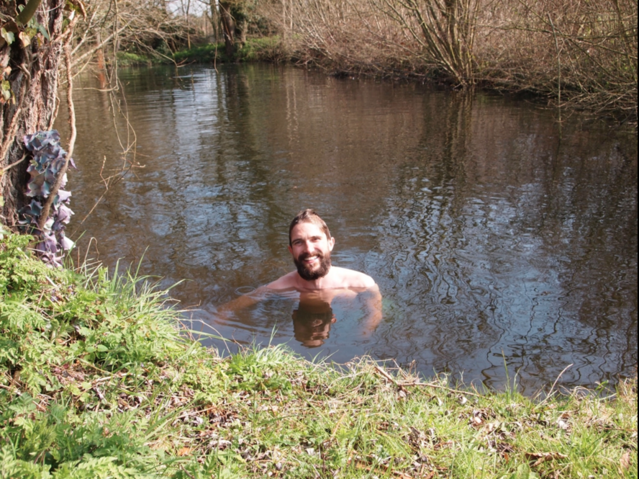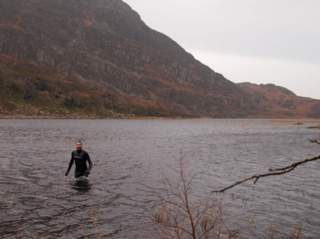
Anxiety
How Swimming Can Help Ease Anxiety
Swimming is the ideal way to meditate and bring your mind to a place of balance.
Posted July 11, 2017

The beach is quiet, the sea flat calm, as I walk purposefully across the pebbles. I slip on my silicone cap, pull on my neoprene shoes to protect against the rough stones and snap on my goggles. I stride into the water.
The beach shelves steeply and I am out of my depth almost immediately. I plunge my face beneath the quiet waves and begin to swim a purposeful breast stroke towards the horizon, before switching to front crawl and swimming against the strong current. The cloudy blue of the English Channel and my long, deep breaths are all I have for company. My mind drops from frantic overthinking to a steady rhythm, slowing to the same pace as my strokes. For the first time today, I am calm.
This is my daily routine and has been ever since I traded in the chaos of living in London for the relative calm of Brighton, fifty miles to the south. My house is on the seafront and the lapping water is just a three minute stroll from my front door.

I learned that swimming was my salvation long before I moved to the sea. My obsession with swimming outdoors was borne out of regular trips across London to the bathing ponds on Hampstead Heath, small lakes where lifeguards stand sentinel over the summer months and hardy types swim throughout winter.
I found its cold water a tonic for an increasingly distressing life I was living as a journalist in one of the world’s most demanding cities. Every day, as my world of endless deadlines and career pressure became more difficult to face up to, I would dive in and become part of nature, swimming alongside ducks, watching the leaves turn a heavy green and then gold as summer waned and the chill of fall began to intimate itself. The rush of dopamine and endorphins was strong, powerful. I wanted more.
It was at this time, seven years ago, that I finally admitted to issues with anxiety. I spent every day in a state of debilitating worry, a cycle that was beginning to tip over into a more permanent state of depression. In swimming, I had unwittingly found a way to ease my mind and bring it back to a state of equilibrium.
As my obsession blossomed, I discovered the work of English naturalist and eccentric Roger Deakin. Deakin’s Waterlog is a cult classic in the UK, detailing his ‘swimmer’s journey through Britain’ in the 1990s. Deakin wanted to delve into nature and see his country from a different perspective than the walker, the runner and the cyclist. I was entranced by his writing and struck by his belief that nature has the ability to cure.
At that point unwilling and embarrassed to admit to others that I had issues and seek professional help, I threw myself into the water. I decided to retrace Deakin’s route across Britain, finding solace, calm and comfort in the icy waters off of the west coast of Scotland, the lidos of the Midlands and the rivers around his Suffolk home.
There is something elemental about swimming – kicking your legs and moving your arms are all that matter in that moment. And being in the moment is what I loved, and still love, about swimming. In it I discovered a form of meditation that I struggled to find on dry land.
That changed when I broke my wrist in a cycling accident and was unable to take to the water half way through my long swimming odyssey. In total despair, I finally reached out to a psychologist who helped me find the same balance out of the water that I found in it. When I began swimming again, I saw it as a wonderful way to blitz my anxiety, although not the sole approach for deal with it in the longer term.
Today, I still swim to soothe myself, knowing that if my mind is racing at 100mph, a brief dip in the cold sea will bring me back to a place where I can face life head on. Diving into something unimaginably vast and remembering to breathe – for me, that is a cure like no other.
Floating: A Life Regained (The Overlook Press) is available now.

